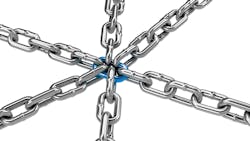The Values in the Value Chain
Every year for our July issue, CONTRACTOR puts together its “Made in America” feature that offers brief profiles of manufacturers who are producing and employing here in the US.
The feature got started as a way to give some positive ink to companies that were still based state-side at a time when it seemed like more and more manufacturers were offshoring production. And, frankly, it’s a nice way to wave the flag a bit for Independence Day.
But this year, amid the ongoing pandemic—the CDC just recorded the highest number of single-day reported cases of COVID-19 since the crisis began—American-made takes on a new significance. A number of those manufacturers profiled in our feature have been deemed essential, just like companies that offer plumbing services, and for just the same reason: they provide things that people simply cannot do without.
Which of course raises the question, if a good or service is essential to Americans, shouldn’t we ensure that it’s produced or provided by Americans? That we control all (or almost all) steps of the supply and production chain so that we aren’t, for example, trying to buy facemasks from China in the middle of a world-spanning healthcare crisis.
The Forum this month is an interview with Eric Truskoski, Sr. Director of Government and Regulatory Affairs for Bradford White Corp. In one part he says, “I do think there’s going to be some sort of realignment, or revaluation by the country as a whole. Once we get to the point where COVID is in check and probably when there’s a vaccine in place, there is going to come a point where we are going to reevaluate, ask what are the lessons we’ve learned from this? Where are we weak as a whole from a supply-chain standpoint, or even as a specific company?”
It’s great for a company to make things in this country. And if it does, it should be proud to slap a “Made in the USA” label on its product as part of marketing and promoting it. And, naturally, the government has to then get involved to certify that claim, so that unscrupulous manufacturers can’t use that label to promote a product that’s only assembled in the US, or made in some other part of the Americas (or, you know, flat-out lie).
But once the government starts saying, “this product has to be produced in the United States,” it opens up a big can of worms. If that product can legitimately be produced elsewhere at less cost, who ends up paying that difference? Will there be government incentives or subsidies? Tariffs to make foreign-made versions of particular products prohibitively expensive? It seems that average Americans—either as end-consumers or taxpayers or both—will end up footing that bill.
All these questions are, I think, worth asking here because manufacturers and the skilled trades are, to some degree, in the same boat. After all, the former makes the appliances, tools and materials that the latter use and install; expenses at one level will affect the bottom line at the next. Regulation on how, say, a boiler needs to be made will very often affect how it has to be installed.
So when that post-COVID conversation starts happening (and it’s probably happening in some places right now) we all need to pay attention, and maybe raise our voices about just what we think is essential and why.
